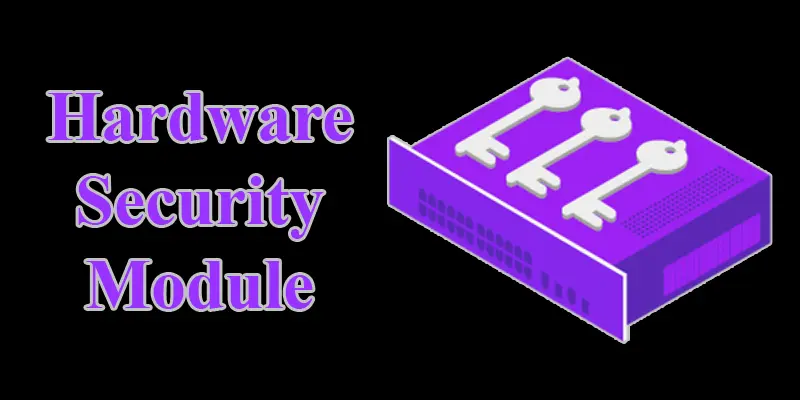HSM (Hardware Security Module): What It Is, Examples, Types, and Features
Published: 15 Nov 2024
What is a Hardware Security Module?
A physical tool called a Hardware Security Module (HSM) is used to protect digital data. It acts like a strong vault for sensitive information, such as passwords, encryption keys, and digital signatures. HSMs are commonly used by banks, governments, and large businesses to protect data from hackers and unauthorized access. They handle encryption and other security tasks, keeping the data locked inside the device and making sure only trusted people or systems can use it.
Example of Hardware HSM
- A bank uses an HSM to protect customer data, like encryption keys, which keep financial transactions secure.
- The HSM safely handles encryption and decryption tasks, keeping these keys hidden from hackers.
- Cloud service providers use HSMs to secure data stored in the cloud, helping prevent data breaches.
- HSMs ensure that only authorized systems or users can access or use critical data, keeping it safe from cyber threats.
How Does HSM Work?
- Secure Storage: HSMs store sensitive information like digital keys inside a super-secure box, making it very hard for hackers to access.
- Encryption and Decryption: HSMs encrypt (scramble) data when it’s being stored or transferred and decrypt (unscramble) it when it needs to be used, keeping it safe from unauthorized access.
- Access Control: Only authorized users or systems are allowed to access the HSM, meaning it has strict security checks to ensure only trusted people or programs can interact with it.
- Tamper Resistance: If someone tries to physically tamper with an HSM, it may erase its stored data or shut down, preventing theft of the information.
- Independent Operation: HSMs operate independently, meaning they handle encryption tasks on their own, without relying on other computer systems, which adds an extra layer of security.
How is HSM Used?
- Protecting Sensitive Data: HSMs securely store sensitive information, like encryption keys, digital certificates, and passwords. For example, in banking, HSMs protect the keys that encrypt customer data, keeping it safe from unauthorized access.
- Handling Secure Transactions: HSMs are used to process and verify secure transactions, like online banking payments or credit card processing. They ensure each transaction is legitimate by encrypting data and verifying identities, keeping digital transactions safe and private.
- Supporting Digital Signatures and Certificates: HSMs create and manage digital signatures and certificates, which confirm that documents, emails, or software are genuine. For example, they’re used by organizations to ensure that their communications and software updates are from a trusted source, preventing tampering.
Why should I use an HSM?
Using an HSM helps keep your sensitive data and digital keys secure from hackers and unauthorized access. It’s like a digital safe that protects information, handles encryption, and ensures that only trusted users can access it. HSMs add an extra layer of security for things like financial transactions, data storage, and digital signatures, making them essential for businesses and organizations that need to keep information private and safe.

Types of Hardware Security Modules
Hardware Security Module (HSM) comes in many types, such as general purpose HSMs, embedded HSMs, and payment HSMs, each offering unique features and use cases for securing sensitive data.
General-Purpose HSMs
These HSMs are versatile and can be used for a range of tasks, like securing digital keys, encrypting data, and verifying digital signatures. Businesses often use them to protect sensitive information across different applications.
Payment HSMs
Specially designed for financial transactions, payment HSMs handle secure credit card processing, online payments, and ATM operations. They make sure transactions are encrypted and authorized, keeping banking and payment data safe.
Network HSMs
These HSMs connect to networks and can be accessed by multiple systems at once. They are often used in data centers or by cloud services to protect data and manage encryption keys across various networked applications.
Embedded HSMs
Embedded HSMs are built into other devices, like servers or computers, to provide added security within those systems. For example, they may be part of a smart card or IoT device, offering a secure way to manage data on individual devices.
Cloud HSMs
Cloud HSMs are hosted in the cloud, allowing organizations to access HSM security features remotely. They’re popular with companies that want strong data protection without needing to manage physical hardware, making them ideal for secure cloud storage and remote operations.
Important HSM Hardware Security Features
- Encryption and Key Management: HSMs store and manage digital keys used to encrypt (protect) and decrypt (unlock) sensitive data. This ensures that only authorized people or systems can access the data, keeping it secure from hackers.
- Tamper Resistance: HSMs are built to detect and defend against tampering. If someone tries to physically open or damage an HSM, it can erase its stored data or shut down, preventing any data theft or unauthorized access.
- Access Control: HSMs use strict controls to make sure that only trusted users or applications can access sensitive information. This can include multi-factor authentication and secure login methods, adding layers of security to prevent unauthorized access.
Data Security and Privacy Compliance
Data security and privacy compliance mean protecting people’s personal information and following laws to keep it private and safe. This includes using tools like encryption to secure data, making sure only authorized people can access it, and meeting legal requirements for handling and storing sensitive information. Compliance helps build trust with users and avoids issues with data breaches or legal fines, ensuring that an organization respects people’s privacy and keeps their data safe.
Cloud Computing and Hardware HSMs
Cloud computing and Hardware Security Modules (HSMs) work together to keep data safe in the cloud.
- Cloud Computing: This is when you use the internet to access services like storage, apps, and processing power instead of using local servers or computers. It allows businesses to store and manage data remotely, making it easier to scale and access information anytime.
- Hardware HSMs in the Cloud: These are specialized devices used to protect sensitive data, like encryption keys, in cloud environments. Cloud providers use HSMs to secure data and ensure that only authorized users can access it, keeping digital information safe from hackers and unauthorized access.
HSM Hardware Security Certificate Management
HSMs (Hardware Security Modules) play a big role in managing security certificates, which are like digital ID cards that verify and protect online communications.
Here’s how HSMs help with certificate management:
- Creating Certificates: HSMs generate security certificates, which confirm the identity of websites or software, showing they are trusted and secure.
- Storing and Protecting: HSMs securely store these certificates and the private keys connected to them, keeping them safe from hackers and unauthorized access.
- Managing and Renewing: HSMs help manage certificates, making it easy to renew them regularly and ensuring they stay valid, which is crucial for keeping data secure over time.
Conclusion about Hardware Security Modules
Hardware Security Modules (HSMs) are essential tools for keeping digital information safe. They securely store and manage sensitive data, like encryption keys and security certificates, preventing unauthorized access and cyber threats. With features like tamper resistance, encryption, and access control, HSMs add a strong layer of protection for businesses and organizations handling critical data. Using an HSM helps ensure that information stays private, secure, and compliant with data protection standards, making them a key part of modern data security.
FAQS – HSM Hardware Security Module
What is an AWS Hardware Security Module?
An AWS Hardware Security Module (HSM) is a cloud-based device offered by Amazon Web Services to securely store and manage encryption keys. It helps protect sensitive data in the cloud by keeping it private and allowing only authorized access.
Who are the main hardware security module vendors?
The main HSM vendors include Thales, AWS, nCipher, IBM, and Utimaco. These companies provide secure devices that help protect sensitive data by securely managing encryption keys and other security tasks.
A Thales hardware security module: what is it?
Digital certificates, encryption keys, and other private data are kept safe in a Thales HSM security device. It helps businesses and organizations secure data, manage transactions, and ensure privacy.
What is a USB hardware security module?
A USB HSM is a small, portable device that connects to a computer through a USB port. It securely stores encryption keys and performs encryption tasks, allowing users to protect data and manage security easily on a personal or small-business level.
Network Hardware Security Module: What is?
An HSM system is a network-connected security device that enables safe data management across several systems or users. It’s commonly used in data centers or cloud environments to protect sensitive data and manage encryption keys across several systems.
nCipher Hardware Security Module: What is?
Sensitive information and encryption keys are safely stored in a nCipher HSM security device. It’s designed to protect digital assets and perform security functions like encryption, decryption, and digital signing for organizations that need high levels of data protection.

- Be Respectful
- Stay Relevant
- Stay Positive
- True Feedback
- Encourage Discussion
- Avoid Spamming
- No Fake News
- Don't Copy-Paste
- No Personal Attacks

- Be Respectful
- Stay Relevant
- Stay Positive
- True Feedback
- Encourage Discussion
- Avoid Spamming
- No Fake News
- Don't Copy-Paste
- No Personal Attacks





